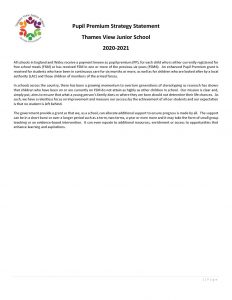Pupil Premium Funding
The Government introduced Pupil Premium Grant (PPG) in April 2011. This grant is additional to main school funding, is seen by the Government as the best way to address the current underlying inequalities between identified groups of pupils.
The Pupil Premium Grant provides funding for two policies:
- Raising the attainment of disadvantaged pupils and closing the gap with their peers.
- Supporting children and young people in the regular armed forces.
The PPG per pupil for 2018-2019 was as follows:
| Type of Pupil | Pupil Premium per pupil |
| Pupils in year groups reception to year 6 recorded as Ever 6 FSM | £1,320 |
| Pupils in years 7 to 11 recorded as Ever 6 FSM | £935 |
| Looked-after children (LAC) defined in the Children Act 1989 as one who is in the care of, or provided with accommodation by, an English local authority | £1,900 |
| Post-LAC Children who have ceased to be looked after by a local authority in England and Wales because of adoption, a special guardianship order, a child arrangements order or a residence order | £1,900 |
| Service Children ‘Ever 4’ | £300 |
Pupil Premium is allocated to schools and is clearly identifiable. Schools can decide how the Pupil Premium is spent, since they are best placed to assess what additional provision should be made for the individual pupils within their responsibility.
School Statement – The Pupil Premium Grant (PPG)
At Thames View Junior we are committed to ensuring all our children make the best possible progress. We track the achievement of every pupil on a regular basis and do all we can to make sure each pupil achieves their potential. We also have a duty to ensure that no group of children are disadvantaged due to their gender, ethnic origin, family income or background.
The Pupil Premium funding allows us to continue and extend what we already do – to monitor pupils’ progress and to give additional support when required. Pupils are certainly not singled out as a stigmatised for getting some extra support and we never label a child in front of other children.
Rationale
The target and strategic use of Pupil Premium Grant will support pupils in achieving their goals.
Principles
We ensure that teaching and learning opportunities meet the needs of all of the pupils (personalised learning)
- We ensure that appropriate provision is made for pupils who belong to vulnerable groups, this includes ensuring that the needs of disadvantaged pupils are adequately assessed and addressed
- In making provision we recognise that not all pupils will be disadvantaged
- We reserve the right to allocate the Pupil Premium Grant funding to support any pupil or groups of pupils the school has legitimately identified as being disadvantaged
- Pupil Premium Grant funding will be allocated following a needs analysis which will identify priority classes, groups or individuals
- The School Leadership Team and Governing Body monitor the impact of all spending and interventions, including pupil premium
Provision
Providing small group work with an experienced, qualified teacher focussed on overcoming gaps in learning
- 1:1 tuition support
- Additional teaching and learning opportunities provided through trained Teaching Assistants and/or external agencies
- Effective use of data to check interventions impact and make adjustments where necessary
- Family support
- Pupil Premium Mentor for additional input for intervention work, Family and emotional support
- Acquiring effective materials aimed at raising standards, particularly in reading and mathematics
Success Criteria
- The success criteria for the Pupil Premium statement are:
- The evaluation of this school payment and our provision is based upon the impact it has on pupil progress and how quickly the school ‘narrows the gap’ between disadvantaged pupils and their peers.
- All our work through the Pupil Premium Grant will be aimed at accelerating progress and moving pupils to at least age related expectations. This data will be extracted from termly pupil progress meetings (PPMs) based around reading, writing and maths. Pupil Premium Grant children will be clearly identified on tracking grids. Pupil Premium resources may also be used to target most able children to enable them to work at a greater depth within the expected standard.
- Early intervention and support for disadvantaged children.
- The vast majority of disadvantaged children will reach their individual targets.
- Effective parental and school support.
- Having an effective system for identifying, assessing and monitoring pupils.
- Having a whole-school approach.
- Create a positive school atmosphere in which pupils’ differences are recognised and valued as full members of the school community; developing confident independent learners.It will be the responsibility of the Head of School to provide regular reports for the Governing Body on:
Reporting
The progress made towards narrowing the gap, by year group, for disadvantaged pupils (PPG)
- An outline of the provision that was made since the last meeting
- An evaluation of the cost effectiveness, in terms of the progress made by pupils receiving a particular provision, when compared with other forms of support
- The Governing Body of the School will ensure that there is an annual statement available to parents on how Pupil Premium Grant funding has been used to address the issue of ‘narrowing the gap’, for disadvantaged pupils. This task will be carried out within the requirements published by the Department for Education (DfE).
Appeals
Any appeals against this policy will be through the Governing Body complaints procedure.
Please click on the link below for our most recent document.
Pupil Premium Strategy 2020-2021
Thames View Junior School Pupil Premium 2019 to 2020 with Review
Thames View Junior School Pupil Premium 2021 to 2022






